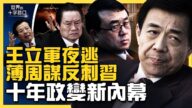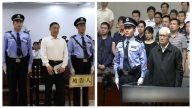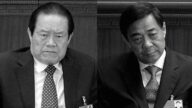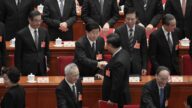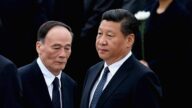【新唐人2013年09月06日讯】中国国营企业中石油腐败风暴,蔓延到海外。据了解,中石油在美国遭到一名投资者起诉,主要是针对中石油没有向投资者公告公司内部腐败问题,违反了美国《证券法》,同时起诉包括董事长兼总裁周吉平在内的4名现任及前任公司管理层。
中石油最近丑闻不断,继上周有多名高管落马之后,4号又传出中石油的4名高阶主管被告上美国联邦法庭事件。
一名投资者向美国曼哈顿联邦法院控告,中石油在8月25号已接获上级部门通知,有4名管理层因涉嫌严重违纪接受调查,但在27号才对外公布,中石油没有即时披露公司内部的腐败问题,明显违反美国《证券法》。
这名投资者表示,在8月28号,有消息披露中国有关部门正就腐败问题对中石油管理层作出调查,当日中石油股价下跌超过3.5%,中石油H股和昆仑能源市值合计蒸发逾217亿元。
与此同时,市场担忧中石油恐怕会遭到美国证券交易委员(SEC)的质询。美国翰宇国际律师事务所的合伙人Daniel Roules认为,美国证券交易委员将对北京的调查作出回应,他们会向中石油发出更多质问。
美国南加州大学公共政策博士叶科:“这次中石油的股票大跌,事实上是反应中石油内部重重问题的一个反应,直接就反应出投资者的心理,包括中石油这样的很多大型国企,它的经济效益其实是很差的,它真正赚取的利润都是因为垄断的地位,或者是信息不公开,很多甚至是造假,各种其他手段,真正如果账务透明的话,然后允许自由审查财务公开的话,其实里面的黑幕一下子就能反映出来。”
在香港上市的中石油股价虽然稍微止跌,但过去4个交易日,在中国和香港上市的“中石油系”企业股价累计蒸发市值超过380亿元人民币。
美国南加州大学公共政策博士叶科:“中国的企业,尤其是国企,它受政治因素的影响非常大,企业的发展决定因素,事实上不是它本身业务经营的发展,而是在很大程度上的政治立场、政治资源,一旦政治上有很大的变动,那么这个企业就会受到很大的冲击,现在中石油就是这样的状况。”
财经专家郑作时也发表文章指出,一个国家的大企业,都是久经市场考验之后不死的竞争个体,所以危机来临的时候,大企业起到了支撑作用。而中国的大型央企们,可以很轻易地看出他们的效率是最为低下的。
独立评论员李善鉴:“中国的国有企业上市,本身就是一个怪胎,为什么这么讲,股票上市在市场经济的社会,它的资产应该是由股东来控制,整个企业也要为股东来服务,可是中国央企完全不是这样,整个是被国家来控制的,那么它的利润、赚的钱,钱到哪里去?从哪来到哪去?整个就是一个黑箱不透明的。”
据大陆媒体《21世纪经济报导》披露,随着中石油腐败案爆发,截止9月4号,昆仑能源、惠生工程、明星电缆受中石油牵连最为严重。其中,被外界认为与中共前常委周永康的儿子周斌有密切关系的惠生工程,9月2号开市急跌16.5%后停牌,至今仍未复牌。分析指出,这次事件含政治意味,主要是想处理周永康的势力。
采访/陈汉 编辑/黄亿美 后制/钟元
China National Petroleum Corruption Scandal Extends Overseas
The corruption scandal involving China National
Petroleum Corp (CNPC) has extended overseas.
Media report that PetroChina, a HK listed subsidiary
of the CNPC, was sued by an investor in the USA.
PetroChina is accused of failure to make timely
disclosure of information on being probed for corruption.
This is against the U.S. Securities Act.
PetroChina President, Zhou Jiping, and three
other top executives are named in the lawsuit.
The CNPC has recently been riddled with scandals,
since its four executives were sacked last week.
On September 4, another four senior managers
of PetroChina were sued in the USA.
Reportedly, an investor has filed a complaint
against PetroChina in a Manhattan federal court.
On August 25, the superior authorities informed
PetroChina that its executives are being probed.
This is related to serious disciplinary violation.
Yet, PetroChina didn’t disclose the
information to investors until August 27.
This practice was in violation of the US Securities Act.
The investor alleged that on August 28, PetroChina stock
dropped over 3.5% when news broke about the probe.
The company lost 21.7 Billion yuan on the value
of its H Shares and of Kunlun Energy shares.
It is speculated that PetroChina may face queries
by the US Securities and Exchange Commission(SEC).
Reportedly, Daniel Roules, a partner at the
US law firm Squire Sanders, commented.
“I expect the SEC to respond to the Chinese
investigation by asking PetroChina more questions."
Ye Ke, Public Policy expert, USA: “The recent plummet
of PetroChina stock mirrors the company’s internal mess.
It also reflects the psychology of investors.
Lots of large Chinese state-owned enterprises, including
PetroChina, have actually had very poor performance.
They have gained profits through monopolies, by
keeping information private, or by counterfeiting.
Openness on financial disclosure
can reveal the inside story."
So far, prices of PetroChina shares
have somewhat stabilized.
Yet, its shares value, in the past four trading
days, has evaporated 38 Billion yuan.
Ye Ke: “China’s enterprises, especially the
SOEs, are heavily subject to political influence.
Their development has never relied on business
success, but their political stance and resources.
Any major political change can severely hammer
the enterprises, and PetroChina is a good example."
Financial expert, Zheng Zuoshi, commented in an article.
He writes, “usually in a country, large enterprises
are winners, after years of market competition.
So in the tide of crisis, large enterprises
are the backbones of the industries.
However it’s easy to see that China’s
central SOEs have the lowest efficiency."
Li Shanjian, commentator: “Chinese SOEs’
going public is interesting in itself. Why?
In a market economy, shareholders control the assets
of a listed company, which works for the shareholder.
But Chinese SOEs are totally different.
They are completely controlled by the Communist
authorities, so where do their profits end up?
And where does the capital come from?
It’s an opaque black box as a whole."
China’s 21st Century Business Herald reports
that three PetroChina subsidiaries have become deeply entangled in the corruption scandal.
The list includes Kunlun Energy,
Wison Engineering, and Star Cable.
Zhou Bin is rumored to be the big
boss behind Wison Engineering.
He is the son of Zhou Yongkang, former
Politburo Standing Committee member.
On September 2, Wison Engineering stock
plummeted 16.5% before trading was suspended.
The suspension still continues.
Observers say that this smacks of politics, which
aims at purging the forces of Zhou Yongkang.



